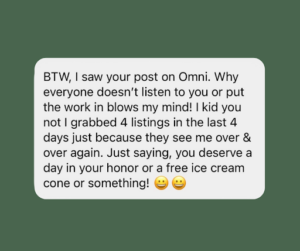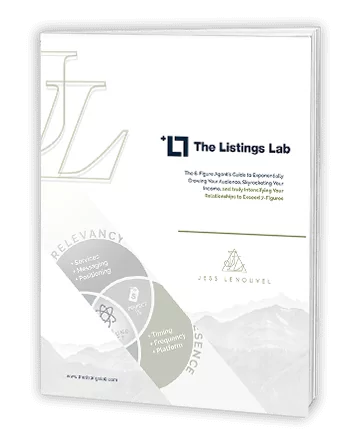Omnipresent marketing isn’t just a buzzword.
It’s a powerful marketing strategy that can help you become the go-to agent in your ideal client’s mind.
When you ditch manual, unscalable marketing techniques like cold calling and constant prospecting and embrace omnipresent marketing:
- You’ll effortlessly attract highly-targeted leads that are *obsessed* with your services.
You can say goodbye to commission hagglers and say hello to prospects that see you as the only agent they want to work with.
Ready to learn how?
Read on to get the full lowdown on omnipresent marketing and how to embrace this powerful real estate marketing strategy.
^ A testimonial to the power of omnipresence from one of our members in The Listings Labs! 😉
What Is Omnipresent Marketing?
Omnipresence is when you literally appear—or at least seem to appear—everywhere in your prospect’s life. You dominate their screen. There are three components to this concept.
- Timing
- Frequency
- Platform
The goal of marketing is always to be in the right place at the right time. What you’re doing is getting your messaging in front of people so consistently and so frequently that, in your client’s eyes, you feel like their only choice to get the help they need to buy or sell their home.
You want to be top of mind at all times.
You’re not just appearing out of the blue when your prospect is trying to make a decision. You’re showing up, offering value, and building a relationship so that by the time they are actually ready to make a transition, you’re the only choice for them. Because you’re the only person who has actually spoken to their specific problems, fears, and desires.
That’s how you eliminate competition, commission haggling, and clients who think of you as a glorified doorman.
How To Implement An Omnipresent Marketing Strategy
For the most part, omnipresent marketing requires you to embrace online marketing.
You want to show up everywhere your prospects go online…to the point that they see you two to five times a day.
This is done through targeting, retargeting, organic social media, and email.
I’m sure you’ve experienced this phenomenon before in your own life.
Maybe you’ve gone to Amazon and clicked on a pool table you were considering buying for your family.
What happens next?
After browsing, the only other ads you’re getting for the next two weeks are ALL about pool tables.
This happens because you’ve been “pixeled,” so that business can now follow you around the internet.
As agents, we can use the same method—retargeting people with various types of psychological content to take someone from a stranger to a client with automation.
Sending the right message, to the right person, at the right time, on the right platform. This gets people to build that “know, like, and trust” factor with you without ever realizing it.
Why Omnipresent Marketing?
Traditional real estate lead generation methods, including geo-farming, are outdated means of Omnipresence. Sure, they’re ways to stay top of mind, but they’re not targeted.
It all goes back to basic psychology. The human brain is said to be able to quickly remember only two names in any industry.
Don’t believe me? Close your eyes and tell me two brands of sneakers.
Ninety-nine percent of the people are going to say “Nike” and “Adidas.”
Why? Because those brands are omnipresent. You want to achieve that same effect in your target market. You want to be the first person your ideal clients think of when it comes to real estate.
Here are three effects that make omnipresent marketing SO powerful.
Omnipresence And The Mere Exposure Effect
Omnipresence also builds trust through something called the mere exposure effect.
The mere exposure effect states that when the human brain is exposed to the same person over and over again, we build trust with that person. While it’s a horrible example, this is closely related to Stockholm Syndrome (about people bonding with their captives).
Omnipresence And The Reciprocity Principle
We also build trust through omnipresent marketing by giving before we ask – otherwise known as serving before we sell.
Think about it like this.
You would never walk up to a complete stranger on the street and ask them for something (unless you were having an emergency)… or would you?
But almost all of today’s real estate marketing asks for something—“Call me”—before the agent has given anything more than a picture of their head.
Being omnipresent means you give value over and over again so that when you do eventually ask for something, it doesn’t feel like such a hard ask. The element of reciprocity is already there.
Omnipresence And The Halo Of Success
Finally, Omnipresence also works so well because of what I call the “halo of success.”
This effect refers to the fact that people usually want to work with those who are trusted and successful. So, here’s an example:
Let’s say that “Sally” sees “John,” the real estate agent, two to five times per day online.
Sally might assume that everyone in the entire market is also seeing John that much.
She’ll probably even think, “Wow, he runs a lot of ads. He’s everywhere. He must be spending a fortune. If he’s spending that much money, then the ads must be working. If the ads are working, he must be really successful, and he must be the person I should talk to.”
What Sally doesn’t realize is that John is placing those ads in front of the people who are relevant. It’s a much smaller audience than just “everyone” and retargeting is actually very cheap to do. It’s the big fish/small pond effect—and it can work quickly. You can become the authority in that niche practically overnight.
What Platforms Can I Use For Omnipresent Marketing?
For most savvy agents, Omnipresence starts with retargeting on Facebook. But that’s just one channel. You can also use YouTube, email ad networks, Instagram, Google, and LinkedIn—they’re all channels where you can show up for your audience.
Omnipresence is about concentrating a good portion of your advertising on someone only after they’ve become a lead.
Why?
Because doing so gives you a much better chance of converting that lead to a client. Take a small number of leads and increase your relevancy by being in front of them
- With the right timing
- The right frequency
- And on the right platform
And you’ll no longer have to go out and chase after leads.
You’ll have them come to YOU.
This is, by the way, also how we bring people into our community in The Listings Lab. Every person who comes into one of our programs is a living, breathing testament to the power of Omnipresence.
Want to build your own powerful, omnipresent marketing machine that helps you attract leads like wildfire?
We’ll coach you how in The Listings Lab.


